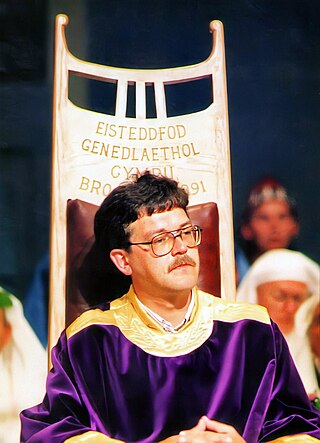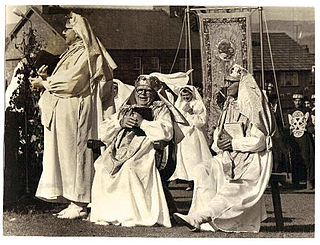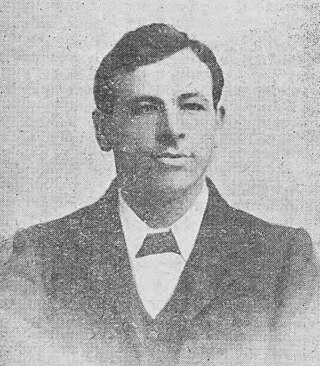
In Welsh culture, an eisteddfod is an institution and festival with several ranked competitions, including in poetry and music. The term eisteddfod, which is formed from the Welsh morphemes: eistedd, meaning 'sit', and fod, meaning 'be', means, according to Hywel Teifi Edwards, "sitting-together." Edwards further defines the earliest form of the eisteddfod as a competitive meeting between bards and minstrels, in which the winner was chosen by a noble or royal patron.

Kate Roberts was one of the foremost Welsh-language authors of the 20th century. Styled Brenhines ein llên, she is known mainly for her short stories, but also wrote novels. Roberts was a prominent Welsh nationalist. In 1963, she was nominated for the Nobel Prize in Literature by Welsh scholar Idris Foster.

Archdruid is the title used by the presiding official of the Gorsedd. The Archdruid presides over the most important ceremonies at the National Eisteddfod of Wales including the Crowning of the Bard, the award of the Prose Medal and the Chairing of the Bard. Although Iolo Morganwg was the first to preside over the Gorsedd when the National Eisteddfod came into being, his successor David Griffith, under the bardic name "Clwydfardd", was the first to be known by the official title "Archdruid".

The National Eisteddfod of Wales is the largest of several eisteddfodau that are held annually, mostly in Wales. Its eight days of competitions and performances are considered the largest music and poetry festival in Europe. Competitors typically number 6,000 or more, and overall attendance generally exceeds 100,000 visitors, the highest recently being 186,000 attending the 2024 festival in Pontypridd. The 2018 Eisteddfod was held in Cardiff Bay with a fence-free 'Maes'. In 2020, the event was held virtually under the name AmGen; events were held over a one-week period.
This article is about the particular significance of the year 1986 to Wales and its people.

Mererid Hopwood is a Welsh poet and lyricist, currently serving as Archdruid of the National Eisteddfod of Wales.

The Chairing of the Bard is one of the most important events in the Welsh eisteddfod tradition. The most famous chairing ceremony takes place at the National Eisteddfod of Wales, and is always on the Friday afternoon of Eisteddfod week. Winners are referred to as Y Prifardd. The custom of chairing the bard is, however, much older than the modern eisteddfod ceremony, and is known to have taken place as early as 1176.
The Crowning of the Bard is one of the most important events in a Welsh eisteddfod or Scottish Gaelic Mòd.
This article is about the particular significance of the year 1953 to Wales and its people.

Sir (Albert) Cynan Evans-Jones CBE, more commonly known within Wales by his bardic name of Cynan, was a Welsh poet and dramatist.

Rev. John Dyfnallt Owen was a Welsh poet, and served as Archdruid of the National Eisteddfod of Wales from 1954 until his death. He was often known simply by his bardic name, "Dyfnallt".

Gwyneth Denver Davies, FLSW, known professionally as Gwyneth Lewis, is a Welsh poet, who was the inaugural National Poet of Wales in 2005. She wrote the text that appears over the Wales Millennium Centre.
Grahame Clive Davies CVO is a Welsh poet, author, editor, librettist, literary critic and former journalist and courtier. He was brought up in the former coal mining village of Coedpoeth near Wrexham in north east Wales.

David Griffith, known by the bardic name of Clwydfardd, was a Welsh poet and Archdruid of the National Eisteddfod of Wales.
This article is about the particular significance of the year 2011 to Wales and its people.

Evan Rees, known by the bardic name Dyfed, was a Calvinistic Methodist minister, poet, and Archdruid of the National Eisteddfod of Wales.
This article is about the particular significance of the year 2014 to Wales and its people.
Evan Gwyndaf Evans or "Gwyndaf" was a Welsh poet who served as Archdruid of the National Eisteddfod of Wales from 1966 to 1969.

Gorsedd Cymru, or simply the Gorsedd, is a society of Welsh-language poets, writers, musicians and others who have contributed to the Welsh language and to public life in Wales. Its aim is to honour such individuals and help develop and promote their fields in addition to maintaining relationships with other Celtic nations and Y Wladfa in Patagonia. The Gorsedd is most prominent at the National Eisteddfod of Wales where it is responsible for the main ceremonies held.
Rhiannon Ifans, FLSW is a Welsh academic specialising in English, Medieval and Welsh literature. She was an Anthony Dyson Fellow at the Centre for Advanced Welsh and Celtic Studies, in University of Wales Trinity St. David. She twice won a Tir na-n-Og prize for her work and won the literary medal competition at the Welsh Eisteddfod, for her 2019 debut novel, Ingrid, which was chosen for the Welsh Literature Exchange Bookshelf. In 2020, Ifans was elected as a Fellow of the Learned Society of Wales.












